GCCA+ @ EDD16 Communicating climate change adaptation
Setting the agenda for action on the ground post-COP21
The Global Climate Change Alliance (GCCA+) stand and brainstorming session at the annual European Development Days event (15-16 June) in Brussels focused visitors’ attention on strengthening dialogue and cooperation with developing countries.
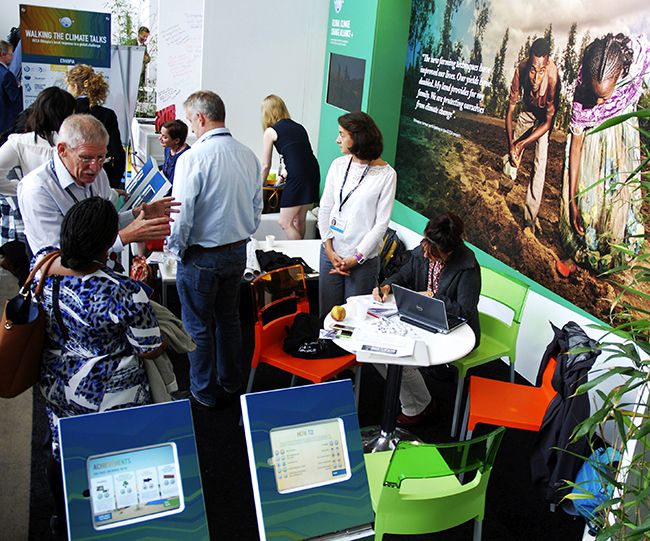 About 40 international development experts gathered at the GCCA+ brainstorming session on 16 June to identify and discuss options to enhance climate change adaptation in the framework of the Paris climate conference agreement in 2015 (COP21).
About 40 international development experts gathered at the GCCA+ brainstorming session on 16 June to identify and discuss options to enhance climate change adaptation in the framework of the Paris climate conference agreement in 2015 (COP21).
The session – ‘Post-COP21: How to translate this landmark climate agreement into applied adaptation strategies?’ – aimed to help the GCCA+ gain insight from a broader range of development aid stakeholders.
Moderator Dr Guido Corno, a GCCA+ climate change policy expert, said the input from the session would be considered during future policy decision-making on implementing adaptation priorities.
“What I heard from participants was that there is a great need to increase knowledge sharing, whether it is technical information about COP21 or policy considerations,” he said after the 75-minute session. “Another issue is the need for more integration of science into the policy discussions.”
He noted that the event was a means for the GCCA+ to widen its network of stakeholders and tap into a broader range of expertise in development aid and support.
“We had representatives here from development banks, smaller NGOs, think-tanks and consultancies,” he added. “Sometimes these kinds of organisations do not come within our radar. This is part of our ongoing strategy to reach those stakeholders and others.”
Closing the knowledge gap
Jan Karremans, a participant at the session and Team Leader Technical Assistance for EuroClima, agreed with the need to gain insights from a wider range of experts in development.
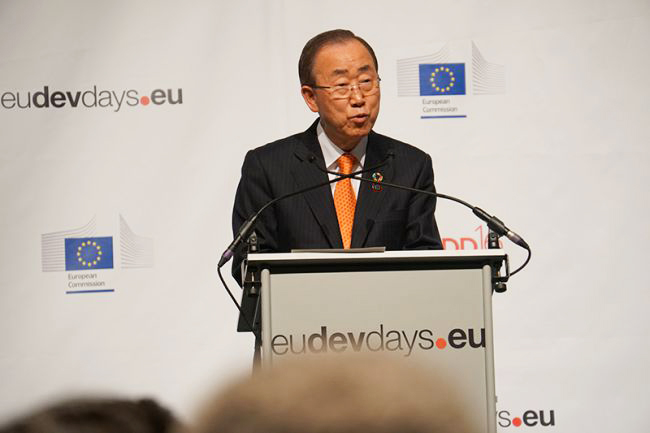 “The brainstorming session was good for networking with people with wider ranges of expertise,” he said. “It was great to hear different ideas from people with a variety of backgrounds. I can apply some of them in my work in Latin America.”
“The brainstorming session was good for networking with people with wider ranges of expertise,” he said. “It was great to hear different ideas from people with a variety of backgrounds. I can apply some of them in my work in Latin America.”
Yolanda Saito, a programme manager at the International Development Law Organization, said climate change practitioners had a lot to gain from experts in other fields, for example those working to implement the Convention on Biological Diversity.
“We can all learn from each other and coordinate and cross-link efforts in both areas,” she said. “A lot of work has been done at the international level. Now it is time to work together at the national and local levels to mainstream climate change in policy.”
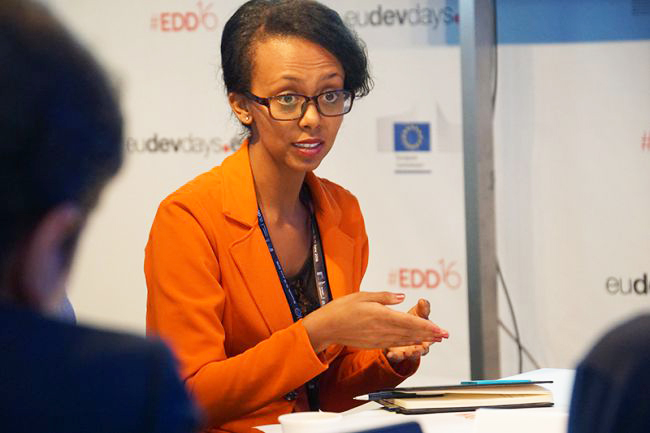 Dr Sara Venturini, a policy advisor on climate change and development economist for Acclimatise/Climalia, said one of the ideas she took from the session was the need for a quantitative way to measure the effects of adaptation strategies.
Dr Sara Venturini, a policy advisor on climate change and development economist for Acclimatise/Climalia, said one of the ideas she took from the session was the need for a quantitative way to measure the effects of adaptation strategies.
“Everything boils down to the need for better indicators,” she said. “One of the great ideas from the session was the call for a climate smart human development index. It is not just about measuring the money being spent. It is also about indicators such as those that measure well-being.”
Helping Ethiopian farmers adapt to a changing climate
The GCCA’s eye-catching installation in the main exhibit hall at EDD16 showcased one of its more than 50 national and regional programmes and projects in developing countries. The stand featured a GCCA+ co-funded project that tests climate-smart agricultural techniques in 34 districts across Ethiopia. Started in 2012, the project is being implemented by GIZ, a German development agency. About 15 000 farmers are involved in testing the pilot techniques.
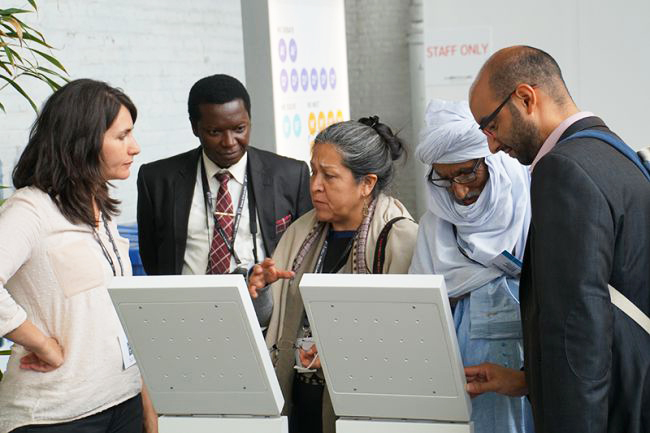 Dr Georg Deichert, a senior advisor for GIZ, said the project ended in January 2016 and the most successful techniques are now being evaluated to determine how to apply them on a larger scale in Ethiopia and other developing countries.
Dr Georg Deichert, a senior advisor for GIZ, said the project ended in January 2016 and the most successful techniques are now being evaluated to determine how to apply them on a larger scale in Ethiopia and other developing countries.
“We are finding good practices that work, such as voluntary area closures that provide benefits to the community while helping to regenerate the land,” he said. “The development of terraces and trenches to conserve soil and water was another success for the project. We have found that there are always trade-offs between adaptation strategies and income generation. That’s why we have to develop climate-smart strategies that find a balance that works for local communities.”
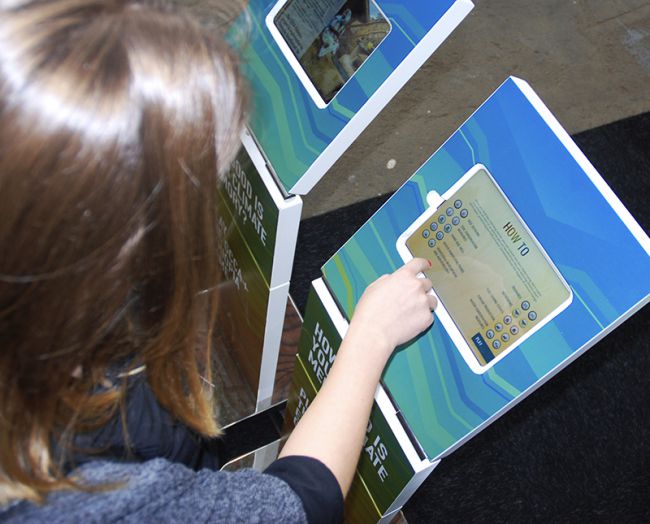 Dr Deichert also engaged visitors in the GCCA’s interactive app, a memory game based on adaptation strategies that could help a farmer in an Ethiopian village. In the game, players turn over virtual stones to reveal illustrations symbolising the range of activities that farmers in the developing world can do to adapt to climate change, such as training, tree planting, fuel-saving stoves and soil-conservation techniques.
Dr Deichert also engaged visitors in the GCCA’s interactive app, a memory game based on adaptation strategies that could help a farmer in an Ethiopian village. In the game, players turn over virtual stones to reveal illustrations symbolising the range of activities that farmers in the developing world can do to adapt to climate change, such as training, tree planting, fuel-saving stoves and soil-conservation techniques.
Dr Deichert said he hopes the app can be developed further and then used to help educate farmers in developing countries.
Marie Lorent, a development worker who played the game, found the app engaging and informative: “It explains complex concepts in a simple way.”
Videos and an infographic at the stand also illustrated the importance of GCCA+ actions and projects to help strengthen national capacity and knowledge on climate-change resilience.
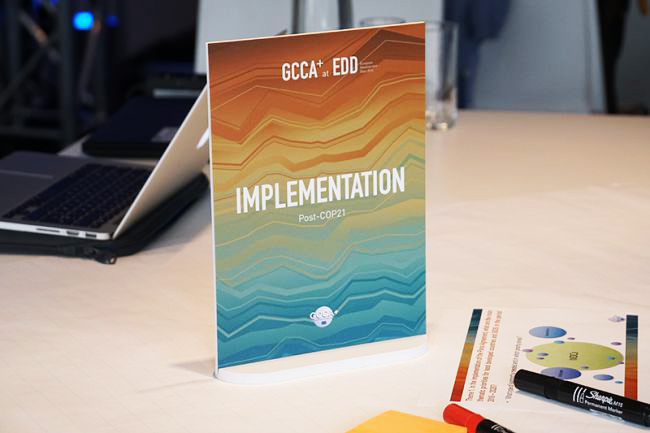 “Effective climate action requires better and deeper understanding of the issues,” said Natalia Reiter, communications expert for the GCCA+. “In order for climate science to be fully absorbed we need to change the way we talk about it. We’re always looking for new ways to innovate, to communicate more effectively.”
“Effective climate action requires better and deeper understanding of the issues,” said Natalia Reiter, communications expert for the GCCA+. “In order for climate science to be fully absorbed we need to change the way we talk about it. We’re always looking for new ways to innovate, to communicate more effectively.”
“Products like this app allow our audiences to engage, share, and exchange ideas and information – a powerful combination which fits perfectly with the GCCA’s role as a platform for policy dialogue,” she added.
Organised by the European Commission, European Development Days brings the development community together each year to share ideas, experiences and innovative solutions to the world’s most pressing challenges.
Video link: https://youtu.be/uc_idMTBYuw The Climate Memory interactive app link: http://www.gcca.eu/node/911 Read more and see images of the stand, interactive game and brainstorming session at:
http://www.gcca.eu/news-and-events/gcca-stories/gcca-edd16-communicating-climate-change-adaptation

